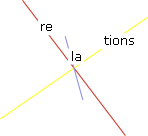|
|
The IRWIN group was founded in Ljubljana (Slovenia). Its members are Dušan Mandic (born in Ljubljana in 1954), Miran Mohar (born in Novo Mesto in 1958), Andrej Savski (born in Ljubljana in 1961), Roman Uranjek (born in Trbovlje in 1961) and Borut Vogelnik (born in Kranj in 1959).
IRWIN, along with the music group "Laibach" (*1980), the performance group "Gledališce Sester Scipion Nasice" (* 1983), later known as the "Kozmokineticni Kabinet Noordung", and the design department Novi Kolektivizem, comprises one of the core groups within the artists’ collective "Neue Slowenische Kunst" (NSK), established in 1984 in the Slovenian republic of the Federal Socialist Republic of Yugoslavia.
As with the other groups within NSK, IRWIN is committed to the so-called ‘retro-principle’. This retro-principle is "not a style or an art trend but a principle of thought, a way of behaving and acting".(IRWIN)
This means, to be more specific, that the visual language developed by IRWIN in the 1980s consists almost exclusively of visual elements quoted from Western and Eastern European art of the 19th and 20th centuries. IRWIN employs motifs from Socialist Realism and the art of the "Third Reich", from the various politically-engaged European avant-garde movements including German Dadaism – in particular the artist John Heartfield –, Italian Futurism and Soviet-Russian Constructivism, as well as from religious art and Slovenian art of the 19th century. These elements are then combined with the Laibach "leitmotifs": eagle, stag, sower, little drummer, and the black cross of the Russian Suprematist Kasimir Malevich. IRWIN assembles these motifs from such varied origins in complex and multi-layered oil paintings in heavy frames.
Since its inception, the group IRWIN has been involving itself extensively with the art history of Eastern Europe in its artistic projects, in particular with the ambivalent inheritance of the historical Russian, but also southern Slavic avant-garde and its totalitarian successors, and thus with the dialectic of avant-garde and totalitarianism. Following the creation of an individual visual language in their appropriation projects of the 1980s, the group has been concentrating since the 1990s on a critical examination of the art history of "Western Modernism", countering it with the "retro-avant-garde" of a fictive "Eastern Modernism" which, in its own obvious artificiality, points to the artificiality of Western art historical structures that continue to exclude contemporary Eastern European art to this day.
At the beginning of the 1990s, the artistic collective NSK transformed from organisation to a "State" in Time, in the framework of which IRWIN played the role of protagonists as well as chronologists (as, for example, in the "Kapital" and "NSK Embassy Moscow" projects) by analysing and recording the processes which had started in Europe after the fall of Socialism. In 1996, the project Transnacionala was started as their initiative. This consisted of a joint journey by ten Eastern European artists from the East to the West coast of the North American continent with an idea to find out how the "West sees the East". All the mentioned projects resulted in books edited by Eda Čufer.
IRWIN is also involved in the creation of three collections of contemporary art and is currently working on the project East Art Map. The members of the group live and work in Ljubljana.
